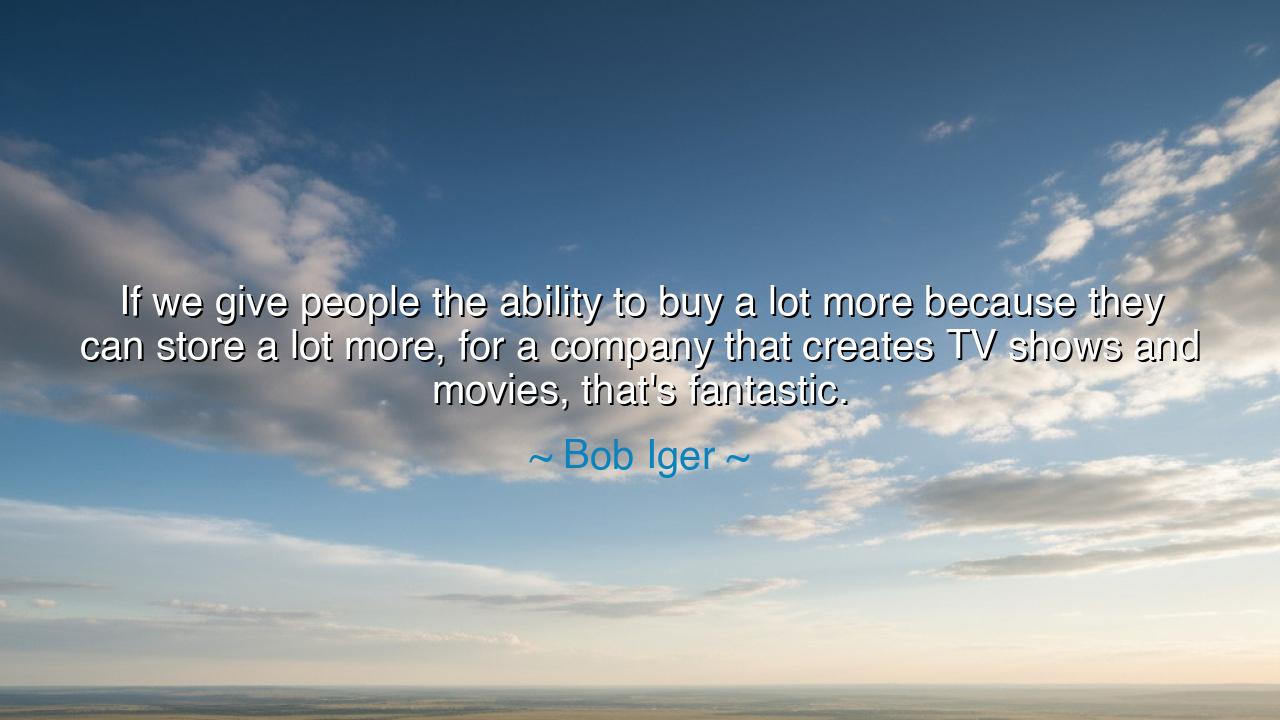
If we give people the ability to buy a lot more because they can
If we give people the ability to buy a lot more because they can store a lot more, for a company that creates TV shows and movies, that's fantastic.






Listen, O future generations, to the words of Bob Iger, a voice of wisdom in the world of commerce and entertainment, as he shares a truth about progress and the power of innovation: "If we give people the ability to buy a lot more because they can store a lot more, for a company that creates TV shows and movies, that's fantastic." In these words, Iger speaks of an age where technology and consumer desire merge, creating new possibilities for both the maker and the seeker. But beneath the surface of this statement lies a profound lesson about the relationship between human progress and the ways we consume.
In the ancient world, O children, there were those who sought to build great empires by giving their people more—more access, more resources, more possibilities. The Romans, for example, built vast networks of roads and aqueducts, enabling the expansion of trade, the movement of armies, and the growth of cities. They understood that when people are given the tools to acquire and store more, whether in the form of goods, knowledge, or power, the potential for growth and achievement becomes boundless. Iger’s words resonate in this ancient wisdom, for he understands that providing the tools to acquire more—the ability to store more—is the key to unlocking the full potential of human creativity and desire.
Consider the creation of libraries in Alexandria, the greatest repositories of knowledge in the ancient world. These libraries allowed scholars from across the lands to store and access more knowledge than ever before, giving rise to an age of intellectual flourishing. It was not just the books themselves that were valuable, but the possibility they represented—the opportunity to learn more, to create more, and to expand the boundaries of human understanding. In much the same way, Iger’s vision for content creation and consumer consumption highlights the transformative power of giving people the ability to store and access more of what they desire, whether it be stories, movies, or shows. The more they can access, the more they will seek, and the more they will consume.
In more recent times, the rise of digital media has reshaped how people interact with the world. With the advent of streaming services and cloud storage, consumers now have the ability to store and access vast libraries of content at their fingertips. This is a revolution that mirrors the Roman roads and the Alexandrian libraries in its own way. It is the same principle: by offering more access, more choices, more opportunities, we empower people to consume and create in ways that were once unimaginable. For the creators of TV shows and movies, this is a golden age, for it offers them an audience that is not only vast but also hungry for more.
But let us not be deceived, O children, for this abundance of access comes with its own challenges. In ancient times, even the vastness of the Roman Empire eventually became its undoing, as the sheer scale of its resources and territories proved difficult to manage. Similarly, in this modern age of endless content, the challenge is not simply to provide more but to ensure that what is offered remains of value. For as we give people the ability to store more, we must also ensure that what they store is worth their time, their attention, and their energy. The question is not only how much can be stored, but how much can be created with purpose.
In your own lives, O future generations, take this lesson to heart: the ability to store and access more is not inherently good or bad; it is what you choose to do with it that defines its worth. Whether you have access to vast libraries of knowledge, the boundless resources of technology, or the unlimited potential of your own mind, you must ask yourself: what will I create with this power? Will you fill your world with content that enriches, that challenges, that inspires? Or will you simply collect without purpose, allowing the treasures of the world to become empty distractions?
Thus, O children, the lesson is this: when given the power to store and access more, seek not only to fill your life with quantity but with quality. Use the tools of progress—whether they be technology, knowledge, or creativity—to enrich the world, to build, and to create. For in this abundance, there is both opportunity and responsibility. The more you store, the more you must give, the more you must create. In this way, you will honor the legacy of those who came before you, who sought to expand the boundaries of what was possible, and you will leave a legacy of your own for those who come after.






AAdministratorAdministrator
Welcome, honored guests. Please leave a comment, we will respond soon